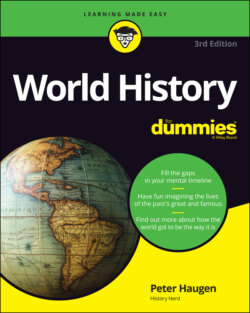Читать книгу World History For Dummies - Peter Haugen - Страница 74
Adapting to the lay of the Greek land
ОглавлениеSea and mountains cut up the Greek homeland, separating people instead of bringing widespread populations together. Yet Greek growers gathered for trade, and from marketplaces, they built cities in mainland valleys and on isolated islands. Greek citizens gathered and lived in these independent cities, and they did something unusual for this stage of history: They talked openly about how the independent city-state (called a polis) should be run.
A city-state is an independent city, not politically part of a larger country. Many city-states, however, ruled broader lands. Athens, one of the best-known Greek city-states, became capital of an empire in the fifth century BC. The Greeks were great sailors who founded new city-states not just in Greece and on the Aegean Islands, as shown in Figure 4-2, but eventually all over the Mediterranean Sea. They settled in places as far away as Sicily and southern Italy. These far-flung city-states were types of colonies in that they preserved and spread Greek language and culture, but they weren’t colonial in the political sense. That is, the remote city-states were often independent. If adventurers from the Greek city-state of Corinth founded a city-state hundreds of miles away, that new city-state wasn’t necessarily a Corinthian possession.
Greek citizens, whether living in Greece, Turkey, or Italy, were free to an extent unheard of in imperial societies such as Persia’s. Most Greek citizens were small farmers for whom freedom meant being able to grow and market their crops without interference. Citizen was far from being a universal status, of course; one had to be a man (never a woman) of Greek parentage and language to be a citizen. (Foreigners who didn’t speak Greek, whose languages sounded like so much “bar bar bar” to the Greeks, were dismissed as barbarians.)
FIGURE 4-2: The Greeks built independent city-states all over the Aegean and well beyond.
Yet among free Greek citizens, the custom of asking questions — about the way the city was run, about the legends of their gods, or about the way nature works — led to exciting advancements. Inquisitiveness fueled philosophy and thought about nature. Mathematics, astronomy, physics, and even biology became issues to theorize about and problems to solve.
